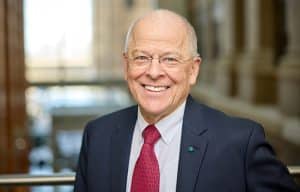Evidence-based decision making | Ott Observations
Before I became a columnist, I spent some years working in healthcare consulting.
One of the big trends was embracing “evidence-based medicine.” Basically, this was a leveraging of ALL of the available information, including patient records, to provide doctors the chance to see what worked and how well.
Prior to EBM, doctors were limited to their personal experience or a consult with a few other doctors. Now they had the chance to provide care based on everyone’s experience. Besides improving healthcare results, a dual objective was to reduce the unnecessary and costly use of drugs, tests and procedures … based on the collective evidence.
Now we are into our second year of confronting a virus that is the worst we’ve seen in a hundred years. Using a body of prior research, in essence scientific evidence, we’ve developed effective vaccine protection faster than ever before.
Our Food and Drug Administration has approved the effectiveness and safety of these vaccines based on the same clinical trial evidence requirements of every other drug we’ve previously used. Yet almost half of Americans still won’t get the vaccine, and have pitched a personal liberty battle over government requirements solely intended to protect the collective community … which is part of government’s job.
The most common response I hear from vaccine resisters is suspicion – that it is unproven, that it is not safe, that it genetically will mutate you, or that the government is implanting microchips in you. Based on what evidence? Somebody that writes a blog? Or a pretend journalist just sharing an opinion with no factual basis? Or the friend you sit next to in the bar?
If you are really interested in making an evidence-based decision about this vaccine, just ask your doctor. And if you don’t trust your doctor, quit seeing him/her when you’re sick, quit taking the drugs they prescribe and quit going to the hospital when you are seriously ill or injured.
About a third of Republicans still don’t believe our last national election was legitimate. Based on what evidence? Over 60 courts reviewed concerns about the election and found no evidence to support those concerns. State election officials reviewed their security processes and in some cases recounted votes, surfacing zero evidence that the results weren’t valid.
If someone accused you of a serious crime and presented no evidence, would you want to be convicted?
Speaking of evidence-based criminal prosecutions, across the river in Missouri is the case of Kevin Strickland. He has spent 43 years in prison for a murder conviction when he was 18. The prosecutor now says he is “factually innocent.” Two others convicted of the same murders have testified he wasn’t there. The sole eyewitness has said her identification was wrong.
Judges in court appearances agreed there is no evidence to support this conviction, yet Missouri law prevents them overturning such convictions.
The only answer is a pardon from the governor. Gov. Mike Parsons said a review of this case is not a priority and he wants to support jury decisions. Based on what evidence, when everyone directly involved says there is no evidence?
Meanwhile he pardoned Mark McCloskey, who confessed to a misdemeanor for waving a gun at protestors.
Kevin Strickland is still in prison.
My dad told me a story of when he was offered a good deal to buy some lakefront property in rural Missouri. It was a very attractive proposition, as he loves to fish and was in the process of teaching me how to fish.
When he visited the property he asked, “Where’s the lake?” The developer told him where the lake was going to be built and that he was getting a great deal buying before the lake’s construction. My dad told him to call back “when there’s a lake.”
Folks, the lake is there for so many things we’re fighting about. If you’re not making evidence-based decisions about your health and our democracy, why not?






